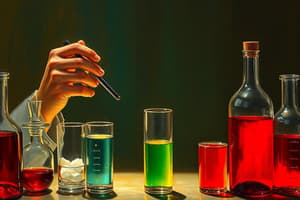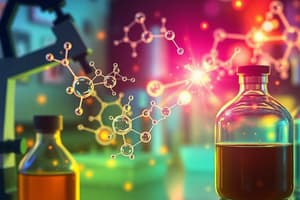Podcast
Questions and Answers
What is the function of Potassium Oxalate as an anti-coagulant?
What is the function of Potassium Oxalate as an anti-coagulant?
- It reacts with calcium to form insoluble calcium oxalate and inhibits calcium participation in coagulation. (correct)
- It reacts with potassium to form soluble potassium oxalate and aids in blood coagulation.
- It reacts with sodium to form insoluble sodium oxalate and prevents clot formation.
- It inhibits the actions of various enzymes involved in blood coagulation.
What is the role of Sodium Fluoride as an anti-coagulant?
What is the role of Sodium Fluoride as an anti-coagulant?
- It inhibits the actions of various enzymes involved in blood coagulation.
- It reacts with calcium to form insoluble calcium fluoride and inhibits calcium participation in coagulation. (correct)
- It reacts with sodium to form soluble sodium fluoride and aids in blood coagulation.
- It reacts with potassium to form insoluble potassium fluoride and prevents clot formation.
What is the effect of Citrate as an anti-coagulant?
What is the effect of Citrate as an anti-coagulant?
- It reacts with calcium to form insoluble citrate and aids in blood coagulation.
- Sodium or Potassium Citrate + Ca++ → Ca-Citrate (soluble, non-ionizable) (correct)
- It inhibits the actions of various enzymes involved in blood coagulation.
- It reacts with potassium to form soluble potassium citrate and prevents clot formation.
What is the function of EDTA as an anti-coagulant?
What is the function of EDTA as an anti-coagulant?
What is the role of Heparin as an anti-coagulant?
What is the role of Heparin as an anti-coagulant?
Flashcards are hidden until you start studying
Study Notes
Introduction to Practical Biochemistry Blood Module
- The blood module is a part of practical biochemistry
- The module covers various topics related to blood biochemistry
Composition of Blood
- Plasma is blood without clotting factors, resulting in serum
- Red Blood Cells (RBCs) are non-nucleated cells composed of:
- 60-65% water
- 35-40% solids, mainly metallo-chromoprotein (Hemoglobin)
Cell Membrane Composition
- Cell membrane or stroma is composed of:
- Protein
- Lipids, such as Lecithin, Cephalin, and Cholesterol
- Semi-permeable membrane
Preparation of Blood Samples
- Whole Blood:
- Mixing blood with water leads to hemolysis of RBCs
- Used for analyzing Hb, Lactate, Pyruvate, and Ammonia levels
- Serum:
- Blood coagulates in the tube if left for a few minutes
- Centrifugation separates serum from blood components
Studying That Suits You
Use AI to generate personalized quizzes and flashcards to suit your learning preferences.




